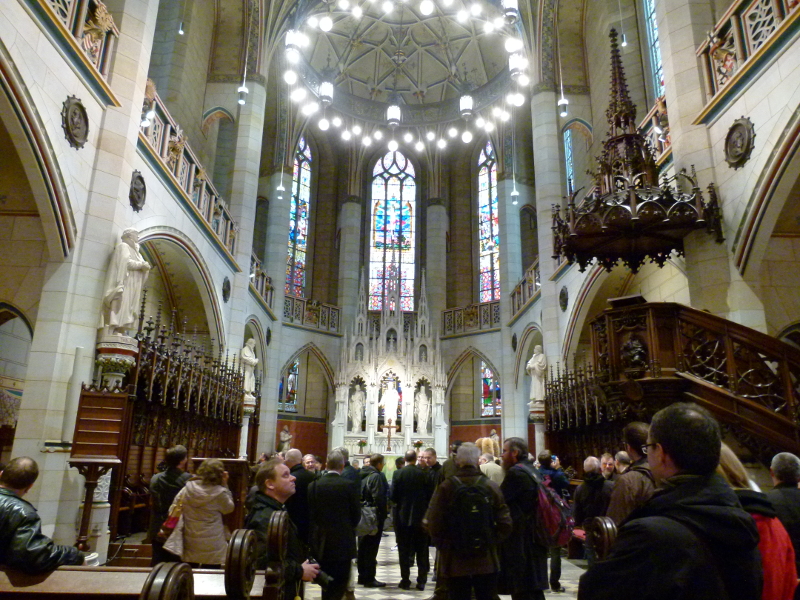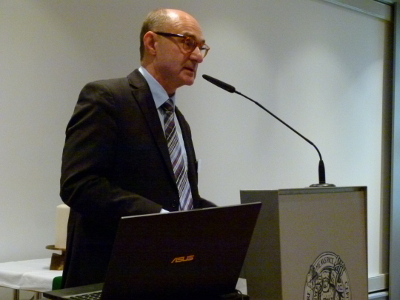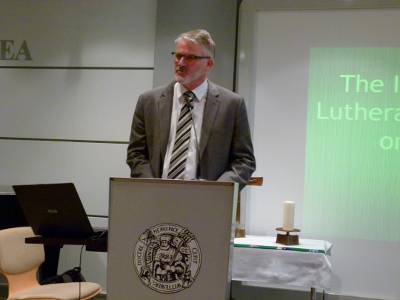
Participants in the 2016 World Seminaries Conference visit at the Castle Church in Wittenberg.
GERMANY – The Sixth World Seminaries Conference of the International Lutheran Council (ILC) opened Tuesday, October 11, 2016 in Wittenberg, Germany. Representatives from more than 30 ILC churches from all world regions are in attendance. In addition, nearly 30 guests representing other church bodies and institutions are present for the conference, which runs through the end of Thursday, October 13.
The choice of Wittenberg as the site of this year’s conference on theological education is an apt one. Martin Luther and Philip Melanchthon were both professors at the University of Wittenberg, and it was in this educational environment that they developed many of the teachings of the Lutheran Reformation.

Dr. Werner Klän addresses the convention.
The theme for this year’s gathering is “Shaping Confessional Lutheranism for the 21st Century: The Impact of the Lutheran Reformation on Mission, Worship, and Worldview.” Professor Dr. Werner Klän, Rector of the Lutherische Theologische Hochschule (Oberursel, Germany), gave a keynote address on the conference theme Tuesday morning, following a service of Matins. “In all these areas, like mission, worship, and worldview, the witness of the Lutheran Reformation must be promulgated untiringly and without fear,” he said. “That is why with gratitude I realize that we share a multitude of points of view amongst our partner churches throughout the ILC, concerning the tasks that lie ahead for confessional Lutheran churches in post-modern and in some parts of the world (like Europe, as it seems to me) even post-Christian times.”
“There can be no doubt,” he continued, “that as long as we are churches bound to Scripture and the Lutheran Confessions and intend to remain so, we will be aware that effectiveness is not ours but the Holy Spirit’s, through God’s Word and the sacraments. It is and will be Him who creates, preserves, and strengthens faith and brings people from all races, cultures, social groups, societies, and nations to salvation.”

Dr. Andrew Pfeiffer discusses the Reformation’s influence on worship.
The three areas referenced in Dr. Klän’s presentation—mission, worship, and worldview—are being developed in additional detail through the keynote addresses of three other speakers throughout the conference. Rev. Dr. Andrew Pfeiffer, Head of the School of Pastoral Studies at Australian Lutheran College (Adelaide, Australia), was the first to present, discussing the impact of the Lutheran Reformation on worship. Rev. Roberto Bustamante, Professor of New Testament at Seminario Concordio (Buenos Aires, Argentina), provided a response.
Participants also broke into small groups to discuss the challenges and opportunites facing theological education in their world regions.
The business of the day concluded with Vespers, held in the Castle Church of Wittenberg, where tradition states Martin Luther once nailed the 95 Theses to the church door. Both Luther and Philip Melanchthon lie buried in the Castle Church. A walking tour of Wittenberg followed Vespers.
———————-
